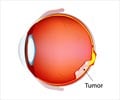A new research has found what may be a possible new heritable marker for retinoblastoma, a pediatric eye cancer triggered by the loss or mutation of both copies of the retinoblastoma gene.
Scientists at the Sbarro Institute for Cancer Research and Molecular Medicine at Temple University in Philadelphia, PA and at the University of Siena in Siena, Italy, have disclosed the possible role of inactivation of the 16INK4A gene in the development of retinoblastoma.Antonio Giordano, lead author of the study and director of the Sbarro Institute and the Center for Biotechnology at Temple, said: "The finding that the expression of p16INK4A was reduced both in patients and their parents in our samples suggests that this alteration could be a novel marker of an inheritable susceptibility to retinoblastoma in young patients."
Researchers examined the 16INK4A gene because of its suspected role in the progression of retinoblastoma and its involvement in a predisposition to familial cancer.
The researchers analysed blood samples of 29 patients and their parents. They found low to moderate 16INK4A protein expression in 5 of 11 retinoblastoma tumor specimens. They also discovered reduced p16INK4a RNA expression in blood, correlated with the demethylation, or reduction, of the p16INK4a gene, in 16 of 29 of retinoblastoma patients relative to normal controls.
Joan O'Brien, Chair of the Department of Ophthalmology at the University of Pennsylvania and Director of the Scheie Eye Institute, said: "Intriguingly, the researchers also found reduced expression in at least one parent among 9 of the 16 (56%) patients with reduced p16INK4a RNA expression. Dr. Giordano and his coworkers suggest that this finding could represent a marker for retinoblastoma susceptibility."
O'Brien added: "Confirmation of this hypothesis by future studies would enhance our understanding of genetic and epigenetic events contributing to this disease."
Advertisement
Source-ANI









